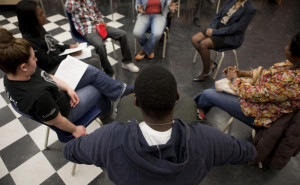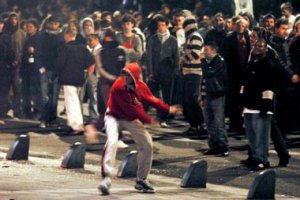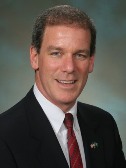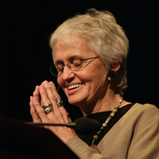News & Announcements
- Details
- Written by Joshua Wachtel
 Photo by Matthew Sherwood for the Toronto StarCatherine Porter has a great column on the front page of the Toronto Star the other day, the city's highest circulation newspaper which also circulates throughout Canada. The piece opens with a moving anecdote:
Photo by Matthew Sherwood for the Toronto StarCatherine Porter has a great column on the front page of the Toronto Star the other day, the city's highest circulation newspaper which also circulates throughout Canada. The piece opens with a moving anecdote:
A week ago, two friends at Weston Collegiate Institute had an argument.
One was a slip of a boy in Grade 9, his plaid shirt buttoned right to the Adam’s apple. The other was an 18-year-old giant — literally 6-foot-8 — with ear buds and a hoodie.
- Details
- Written by Joshua Wachtel
 Inquirer staff celebrate their Pulitzer Prize for public service. (MICHAEL BRYANT / Inquirer Staff Photographer)The Philadelphia Inquirer has won a Pulitzer Prize for its seven-part series last year, "Assault on Learning." The article "revealed that violence in city schools was widespread and underreported, with 30,000 serious incidents over the last five school years. Those findings were later corroborated by a Philadelphia School District panel on safety, spurred an overhaul of incident reporting in the district, and prompted hiring of a state-funded safe-schools advocate." (See "Inquirer wins Pulitzer Prize for school violence series" by Inquirer staff writer Mike Armstrong.)
Inquirer staff celebrate their Pulitzer Prize for public service. (MICHAEL BRYANT / Inquirer Staff Photographer)The Philadelphia Inquirer has won a Pulitzer Prize for its seven-part series last year, "Assault on Learning." The article "revealed that violence in city schools was widespread and underreported, with 30,000 serious incidents over the last five school years. Those findings were later corroborated by a Philadelphia School District panel on safety, spurred an overhaul of incident reporting in the district, and prompted hiring of a state-funded safe-schools advocate." (See "Inquirer wins Pulitzer Prize for school violence series" by Inquirer staff writer Mike Armstrong.)
In part 6 of the series, "Some Antiviolence Efforts Are Working," staff writers discussed restorative practices quote John Bailie, IIRP's Director of Continuing Education:
- Details
- Written by Joshua Wachtel
 Van Brunt Elementary and Middle School Faculty"There are no bullies in Horicon, only students who have made bad choices. Taking a positive and proactive approach to improve the school environment, the Horicon Van Brunt Elementary and Middle School has changed its approach when responding to students who have made bad choices--and reduced disciplinary referrals by over 60 percent since 2009."
Van Brunt Elementary and Middle School Faculty"There are no bullies in Horicon, only students who have made bad choices. Taking a positive and proactive approach to improve the school environment, the Horicon Van Brunt Elementary and Middle School has changed its approach when responding to students who have made bad choices--and reduced disciplinary referrals by over 60 percent since 2009."
This is the lead in of an article co-authored by Robert D. Rettmann and Patrice Vossekuil, IIRP's Wisconsin affiliate. The article originally appeared in the Journal of Safe Management of Disruptive and Assaultive Behavior in March, 2012. In it the authors discuss the use of restorative circles as well as a unique playground program:
- Details
- Written by Joshua Wachtel
Philadelphia, Pennsylvania public school students have launched the "Safe to Count on Me Campaign." Their kickoff rally is scheduled for 3pm on April 25, 2012 at Norris Square Park (Howard & Diamond Streets) in Philadelphia. Confirmed guests speakers include:
· Mayor of Philadelphia, Michael Nutter
· Councilwoman Maria Quiñones-Sánchez
· State Representative Tony Payton
· Student Advocates from Youth United For Change
- Details
- Written by Joshua Wachtel
Helping, fixing and serving represent three different ways of seeing life. When you help, you see life as weak. When you fix, you see life as broken. When you serve, you see life as whole. Fixing and helping may be the work of the ego, and service the work of the soul.
Read the rest of this insightful article here: DailyGood: Helping, Fixing or Serving?, by Rachel Naomi Remen, MD.
To discuss: Is this another way of saying, "not to or for, but with"?
Please respond in the comments section.
- Details
- Written by Joshua Wachtel
Here's a clip from an article by Martin Howard that appeared at Restorative Justice Online's blog. The Sycamore Tree Project connects victims of crime with offenders in prisons.
"I've never seen a program change people like this one."
I've heard this from a prison psychologist and a prison manager, who are more familiar with the failures of the typical group therapy sessions. What they notice during STP is a change in the empathy level of the inmates. And they are stunned by the positive chemistry that is created within the group.
- Details
- Written by Joshua Wachtel
Sticking with the theme of anecdotes, here's one from last week's eForum article by IIRP graduate student Tamam Moncur about her experience adapting restorative practices for use within the context of a weekly church soup kitchen.
- Details
- Written by Joshua Wachtel
 Pennsylvania Approves 4-Day Institutes for Social Worker Continuing EdTwo Four Day Institutes – Basic Restorative Practices and Responding to Grief, Trauma & Adversity – have been approved by the PA chapter of the National Association for Social Workers (NASW-PA) for continuing education credits.
Pennsylvania Approves 4-Day Institutes for Social Worker Continuing EdTwo Four Day Institutes – Basic Restorative Practices and Responding to Grief, Trauma & Adversity – have been approved by the PA chapter of the National Association for Social Workers (NASW-PA) for continuing education credits.
Social workers in Pennsylvania should take note of upcoming Basic Restorative Practices Institutes in Philadelphia (June 25 to 28) and Bethlehem, Pennsylvania (July 9 to 12), as well as Responding to Grief, Trauma & Adversity in Bethlehem (July 23 to 26).
NASW has been designated as a pre-approved provider of professional continuing education for the social worker (Section 47.36), marriage and family therapist (48.36), and professional counselor (49.36) by the PA State Board of Social Workers, Marriage & Family Therapist and Professional Counselors.
Currently teachers and administrators may earn PA Act 45, PA Act 48 and NJ DOE Professional Development credits by taking IIRP courses and participating in professional development experiences.
- Details
- Written by Joshua Wachtel
 from dash24.comEveryone loves a good story, and I'm no exception – especially a good anecdote about an instance of restorative justice or some other more informal restorative interaction. These anecdotes, more than anything, can often cut through a person's doubt and questions about how RJ works.
from dash24.comEveryone loves a good story, and I'm no exception – especially a good anecdote about an instance of restorative justice or some other more informal restorative interaction. These anecdotes, more than anything, can often cut through a person's doubt and questions about how RJ works.
So here's a story from the UK's 24dash.com by Julien Tremblin, dated November 17, 2011 but posted today on twitter by Theo Gavrielides:
- Details
- Written by Joshua Wachtel
 Bill sponsor, Roger GoodmanOn March 30, 2012 Washington State Governor Chris Gregoire signed into law legislation that makes restorative justice available to youth offenders. The bill, co-sponsored by state Reps. Roger Goodman and Ruth Kagi passed unanimously in both the house and the senate.
Bill sponsor, Roger GoodmanOn March 30, 2012 Washington State Governor Chris Gregoire signed into law legislation that makes restorative justice available to youth offenders. The bill, co-sponsored by state Reps. Roger Goodman and Ruth Kagi passed unanimously in both the house and the senate.
The law builds upon an existing mechanism in Washington state which allows a "diversion unit" – a probation counselor or community accountability board – to arrive at a diversion agreement with a young offender in lieu of a court hearing and sentence. Formerly this included, according to the law, things like paying restitution, performing community service and attending counseling. The new law now adds restorative justice to the menu of options the diversion unit may recommend.

Restorative Works Year in Review 2024 (PDF)
All our donors are acknowledged annually in Restorative Works.

